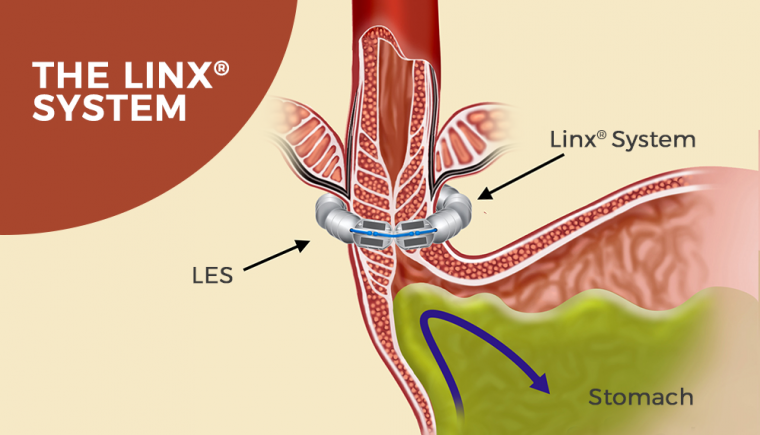Most people experience acid reflux every now and then, but if it occurs more than twice a week and is persistent, a doctor may diagnose gastroesophageal reflux disease. GERD is a long-term condition in which acid from the stomach comes into the esophagus, causing painful heartburn and other symptoms and possible tissue damage.
Doctors often treat GERD with medications and suggest lifestyle changes to improve symptoms. If lifestyle changes and medications do not significantly improve the symptoms of GERD, a gastroenterologist may recommend reflux surgery.
Until a few years ago, there were only a few surgical treatment options, such as fundoplication or endoscopic procedures, such as endoscopic sewing. Then a new minimally invasive laparoscopic procedure designed explicitly for GERD surfaced using a device called the LINX® Reflux Management System.
Read on to learn more about what the LINX® device is and how it is being used to improve the lives of those suffering from GERD in Middle Tennessee.
WHAT IS THE LINX® REFLUX MANAGEMENT SYSTEM AND LINX® SURGERY?
LINX® is a registered trademark of Torax Medical, Inc. The LINX system is a revolutionary and minimally invasive treatment that helps control heartburn symptoms by keeping stomach acid away from your esophagus.
The system consists of a small, flexible band of magnetic titanium beads connected with titanium wires forming a ring shape. The surgeon makes a small incision about the size of a pencil eraser in the abdomen, and the device is surgically implanted around the lower esophagus, just above the stomach. This strengthens the esophagus and restricts the flow of stomach contents into the esophagus (reflux.)
The surgery is so effective in improving heartburn symptoms and reflux that most people with GERD no longer require medicines to treat these symptoms.
ABOUT TORAX® MEDICAL
Torax® Medical, Inc. is a privately held medical device company headquartered in St. Paul, Minnesota. The Magnetic Sphincter Augmentation (MSA) technology was specially developed for treating sphincter disorders.
Torax Medical is currently marketing both the LINX® Reflux Management System for treating GERD and its FENIX™ Continence Restoration System for treating Fecal Incontinence (FI) in Europe. For more information, please visit www.toraxmedical.com.
THE BENEFITS OF THE LINX® REFLUX MANAGEMENT SYSTEM
Instead of reflux surgery, many patients use medication to manage their GERD. However, most medication does not treat the underlying problem. Surgical management is the only way to stop the reflux from occurring altogether.
While other reflux surgeries, such as endoscopic procedures, are still used to treat GERD– because it is a minimally invasive option, the LINX® is becoming the preferred treatment for patients suffering from GERD.
There are multiple advantages of LINX® over other reflux surgeries, such as:
- LINX is minimally invasive: You will be under general anesthesia during the reflux surgery, but the surgery itself is considered minimally invasive. It only takes about 30 minutes to complete the procedure.
- LINX does not require a lengthy hospital stay: Patients generally go home on the same day as the reflux surgery or the next.
- LINX recovery is faster than other reflux surgery: LINX begins working immediately. Instead of waiting weeks, you can return to a normal diet as soon as the day after surgery.
- LINX does not change your anatomy or esophageal function: The LINX device is implanted around your esophagus and doesn’t require surgically altering your digestive system. It also doesn’t interfere with your ability to swallow food or liquids and doesn’t result in bloating by limiting the passage of air from your stomach.
- LINX is non-interfering and removable: If you and your doctor decide to go down a different treatment path in the future, the LINX device does not limit your options. If needed, it can be safely removed with an additional laparoscopic procedure.
WHO IS A CANDIDATE FOR LINX® REFLUX MANAGEMENT SYSTEM?
The LINX® device is used in GERD patients who continue to have heartburn and reflux, despite lifestyle changes and daily use of medicines such as proton pump inhibitors.
It is an excellent option for anyone that is considered a candidate for reflux surgery but wants a more non-invasive approach to GERD treatment.
IS THE LINX® REFLUX MANAGEMENT SYSTEM SAFE AND EFFECTIVE?
Considering this is a newer treatment option for GERD, we understand your concerns. However, you can rest assured that this reflux surgery is safe and proven to be effective. In fact, a LINX® device implant has fewer associated side effects than fundoplication operations.
A growing body of literature supports its safety, efficacy, and long-term durability. In a recently published 5-year follow-up of patients who had a LINX device implanted as a part of the FDA trial, no device erosions, migrations, or malfunctions were noted.
In this trial, control of GERD symptoms was excellent. According to the study, after treatment with LINX® :
- 85 percent of patients were free from dependence on daily reflux medication.
- 88 percent of patients reported that heartburn had been eliminated.
- 99 percent of patients eliminated regurgitation.
- Patients reported significant improvement in gassiness and bloating.
In the short time we’ve been using the LINX® device to treat GERD patients here at The Surgical Clinic, we have seen the same positive results!
LEFT UNTREATED, WHAT PROBLEMS DOES GERD CAUSE?
The American College of Gastroenterology says that 1 in 5 people living in the United States experiences heartburn every day. Torax® Medical, Inc., the makers of the LINX® Reflux Management System, reports that approximately seven million people in the United States have some symptoms of GERD.
This condition develops due to a weak lower esophageal sphincter that allows harmful gastric fluid to reflux into the esophagus. Symptoms of GERD include heartburn, regurgitation, cough, and chest pain.
Acid suppression drugs, such as Prevacid®, Nexium®, and Prilosec®, affect gastric acid production and can help manage GERD symptoms but do not repair the sphincter defect. As a result, these drugs will not prevent further acid reflux symptoms.
In addition, new studies have shown dangers of using acid-suppression drugs over time. As a result, people with GERD must take extra care of their diet and make other lifestyle changes to better manage GERD symptoms.
Left untreated or improperly managed, GERD can progress to a precancerous condition known as Barrett’s esophagus. As GERD progresses, the acid can damage teeth and sinuses and can even lead to esophageal cancer.
HOW LONG CAN GERD SYMPTOMS LAST?
Heartburn can cause burning, pressure, or pain lasting up to 2 hours. It’s usually harsher after a meal. Heartburn can also be caused by lying down or bending over. Many people find that standing upright or taking an antacid that clears acid from the esophagus helps them feel better.
Practical Tips for Managing GERD
Even if you’re considering advanced treatments like the LINX® system, many patients in Nashville benefit from simple lifestyle changes that can ease daily symptoms of acid reflux. These practical steps can help reduce heartburn and improve overall digestive health:
- Adjust your eating habits – Eating smaller, more frequent meals instead of large portions can lessen the pressure on your stomach and reduce reflux. Avoid lying down right after eating.
- Limit trigger foods – Common culprits like caffeine, alcohol, spicy foods, and fried meals often make GERD symptoms worse. Explore our guide on foods to avoid with GERD for more details.
- Maintain a healthy weight – Extra abdominal pressure can push acid upward into the esophagus. Weight management is an important part of long-term reflux control.
- Sleep smart – Elevating the head of your bed or sleeping on your left side can reduce nighttime reflux episodes.
- Consider over-the-counter options – While lifestyle changes can help, some patients find temporary relief with antacids or acid-reducing medications. For chronic symptoms, a visit to our GERD Treatment Center in Nashville can help you explore lasting solutions.
If you’ve tried these approaches and still struggle with persistent heartburn or regurgitation, it may be time to talk with one of our specialists about advanced treatment options like LINX®. The Surgical Clinic proudly serves patients throughout Nashville and Middle Tennessee with cutting-edge care for acid reflux.
SCHEDULE YOUR LINX® CONSULT IN MIDDLE TENNESSEE
It is important that you choose a surgeon that has been trained and has experience using the LINX® device. We are proud to be the first in Tennessee to offer this revolutionary, non-invasive, life-altering solution to patients suffering from GERD.
Contact us if you would like to learn more about the LINX® device and whether this treatment might be right for you. We’d be happy to answer any questions that you have.
Additionally, if you would like to learn more about other gastrointestinal surgery options, you can visit our blog archives from May 2017 for more information.
Frequently Asked Questions
What makes the LINX® procedure different from other acid reflux treatments in Nashville?
LINX® is a minimally invasive procedure that uses a small, flexible band of magnetic beads to strengthen the lower esophageal sphincter. Unlike traditional surgery, it allows natural swallowing and belching while preventing stomach acid from flowing back up the esophagus.
Am I a candidate for LINX® if I’ve struggled with acid reflux for years?
Many Nashville patients with chronic GERD symptoms, such as frequent heartburn or regurgitation, may qualify. Your doctor will evaluate your condition, medical history, and previous treatments to determine if LINX® is right for you.
How long does it take to recover from LINX® surgery?
Most patients return home the same day and can resume normal activities within a few days. Recovery is generally quicker compared to traditional acid reflux surgeries like Nissen fundoplication.
Is LINX® available in Nashville, Tennessee?
Yes. The Surgical Clinic provides LINX® reflux management for patients across Nashville and Middle Tennessee. Our surgeons are highly experienced in advanced GERD procedures.
What are the benefits of choosing LINX® over long-term acid reflux medications?
LINX® offers lasting relief without the side effects or dependency of daily medications. Many patients reduce or eliminate the need for acid reflux drugs after surgery.
How do I schedule a consultation for acid reflux treatment in Nashville?
You can contact The Surgical Clinic to schedule an appointment at one of our Nashville area locations. Our team will discuss your symptoms, evaluate your options, and help determine the best treatment plan.


